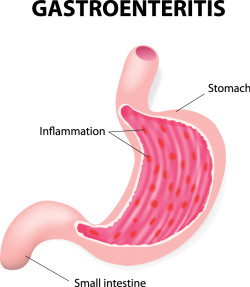Children's Emergency Department is now located in Children's Tower: 1001 E. Marshall Street.
Learn more
Central Virginia news sources are reporting an increase in cases of gastroenteritis (the “stomach flu”) in the area. Earlier this week, more than 400 cases were reported at Hampton-Sydney College, causing school officials to cancel classes and athletic activities through the weekend. Doctors in Short Pump have seen a spike in patients with this condition, according to nbc12.com, and cases have also been popping up in Richmond, Chesterfield and Henrico. Children’s Hospital of Richmond at VCU’s (CHoR) interim chief of general pediatrics, Dr. N. Romesh Wijesooriya, shares what parents need to know about this easily spread illness:
 Though it is commonly referred to as the “stomach flu” and has some similar symptoms to the respiratory flu, gastroenteritis is not actually a type of flu. Gastroenteritis is an inflammation of the lining of the intestines caused by a virus, bacteria or parasites. Symptoms of gastroenteritis include diarrhea, stomach pain, vomiting, headache, fever and chills.
Though it is commonly referred to as the “stomach flu” and has some similar symptoms to the respiratory flu, gastroenteritis is not actually a type of flu. Gastroenteritis is an inflammation of the lining of the intestines caused by a virus, bacteria or parasites. Symptoms of gastroenteritis include diarrhea, stomach pain, vomiting, headache, fever and chills.
Gastroenteritis is most commonly caused by a virus. There are many different kinds of viruses that can cause gastroenteritis but the most common types are rotavirus and norovirus. Rotavirus is the world’s most common cause of diarrhea in infants and young children. Norovirus is the most common cause of serious gastroenteritis and also foodborne disease outbreaks in the United States.
According to the CDC, rotavirus spreads easily among infants and young children. Children can spread the virus both before and after they become sick with diarrhea and are most likely to pass the virus from their body into the environment when they are sick and during the first 3 days after they recover. There are two vaccines that can be given to infants to help prevent rotavirus. Talk to your child’s doctor or health care provider about the vaccines.
Both the CDC and the Virginia Department of Health consider norovirus a highly contagious virus. Norovirus disease usually begins 12-48 hours after exposure, but can appear as early as 10 hours after exposure. Individuals are most contagious when they are sick and during the first few days after recovering. There is no vaccination to prevent norovirus infection although the CDC reports that research is being conducted in this area. Because there are many strains of norovirus, people who have been sick with norovirus can get it again throughout their lifetime.
 Individuals become infected with rotavirus or norovirus by accidentally getting stool (feces) or vomit from infected people in their mouth. This usually happens by:
Individuals become infected with rotavirus or norovirus by accidentally getting stool (feces) or vomit from infected people in their mouth. This usually happens by:
Other viruses that cause gastroenteritis infection are also likely to spread in this way.
Although it is not as common, different types of bacteria can also cause gastroenteritis. Salmonella is one of the most common bacterial causes of gastroenteritis in the United States and it is usually spread by undercooked poultry, eggs or poultry juices. (This is often referred to as “food poisoning.”) Another bacteria, shigella, is often passed around in day care centers. It typically is spread from person to person and common sources of infection are contaminated food and drinking water. Parasites in contaminated swimming pools or drinking water can also cause gastroenteritis. However, this is very rare in the United States.
There is no specific medication for gastroenteritis. With the exception of certain infections in young infants and individuals who have compromised immune systems, gastroenteritis cannot be treated with antibiotics. Check with your doctor before giving your child any medicine for gastroenteritis. Drugs used to control diarrhea and vomiting aren’t usually given to children younger than 5.
Dr. N. Romesh Wijesooriya, a CHoR pediatrician and father of two boys (ages 5 and 7), suggests that treatment of gastroenteritis focus on preventing dehydration.
The most common problem associated with gastroenteritis is dehydration (a condition that occurs when the body does not have enough water or fluids to carry out normal day-to-day functions). This can happen if individuals do not drink enough fluids to replace what they lose through vomiting and diarrhea. Dehydration is most common in babies, young children, the elderly, and people with weak immune systems. Signs of dehydration include dry skin and a dry mouth, feeling lightheaded, being really thirsty, and not peeing as much. Children can get dehydrated quickly, so it’s important that you watch closely for these signs and call your doctor if you see any of these symptoms. If you have a baby, look for fewer, drier diapers as a sign of dehydration. If your infant has not had a wet diaper in 6-8 hours you should contact your pediatrician.
 “If your child has no signs of dehydration you should encourage them to continue their usual diet plus drink adequate fluids,” said Wijesooriya. “If they do not want to eat, offer them a commercial oral rehydration solution like Pedialyte in small amounts until their appetite returns. If your child is showing signs of mild to moderate dehydration (no urine output for six – eight hours, dry and sticky lips/mouth, no tears when crying or sunken eyes) contact your pediatrician immediately to discuss next steps.” - Dr. N. Romesh Wijesooriya
“If your child has no signs of dehydration you should encourage them to continue their usual diet plus drink adequate fluids,” said Wijesooriya. “If they do not want to eat, offer them a commercial oral rehydration solution like Pedialyte in small amounts until their appetite returns. If your child is showing signs of mild to moderate dehydration (no urine output for six – eight hours, dry and sticky lips/mouth, no tears when crying or sunken eyes) contact your pediatrician immediately to discuss next steps.” - Dr. N. Romesh Wijesooriya
For children over age 1, the American Academy of Pediatrics recommends clear liquids (like Pedialyte) in small amounts ranging from 2 teaspoons to 2 tablespoons, every 15 minutes as a method to help prevent dehydration. They AAP has different recommendations for preventing dehydration in infants under age 1 and under 6 months of age.
The CDC recommends the following to help stop the spread of viruses that cause gastroenteritis infection:
Resources
What is gastroenteritis:NIH, WEBMD
Are rotavirus and norovirus contagious: CDC – Norovirus, CDC- Rotavirus, VDH
How does gastroenteritis spread: WEBMD
How is gastroenteritis treated: WEBMD
Gastroenteritis and dehydration: NIH
Preventing dehydration: KidsHealth
Tips for preventing gastroenteritis: CDC